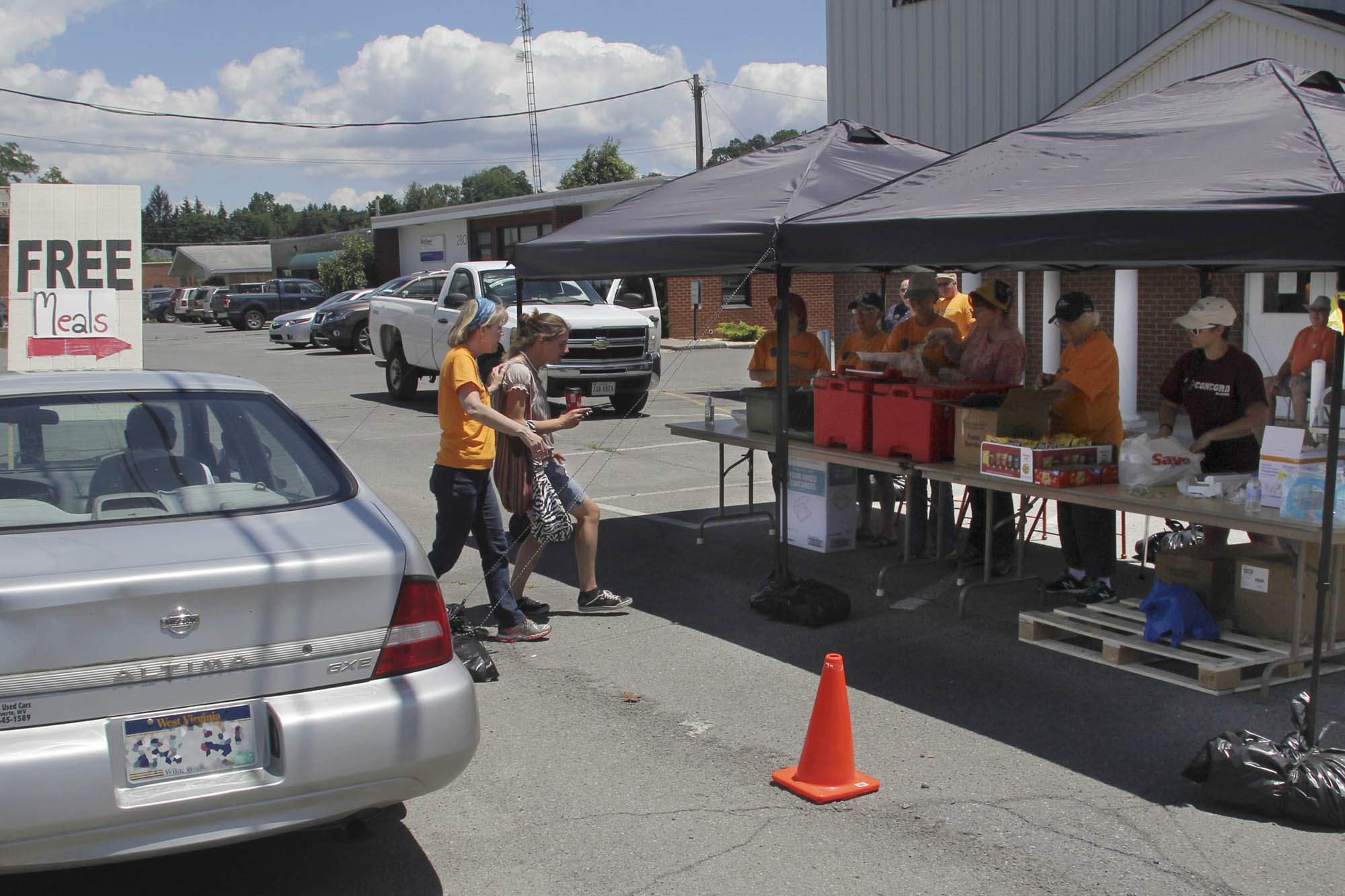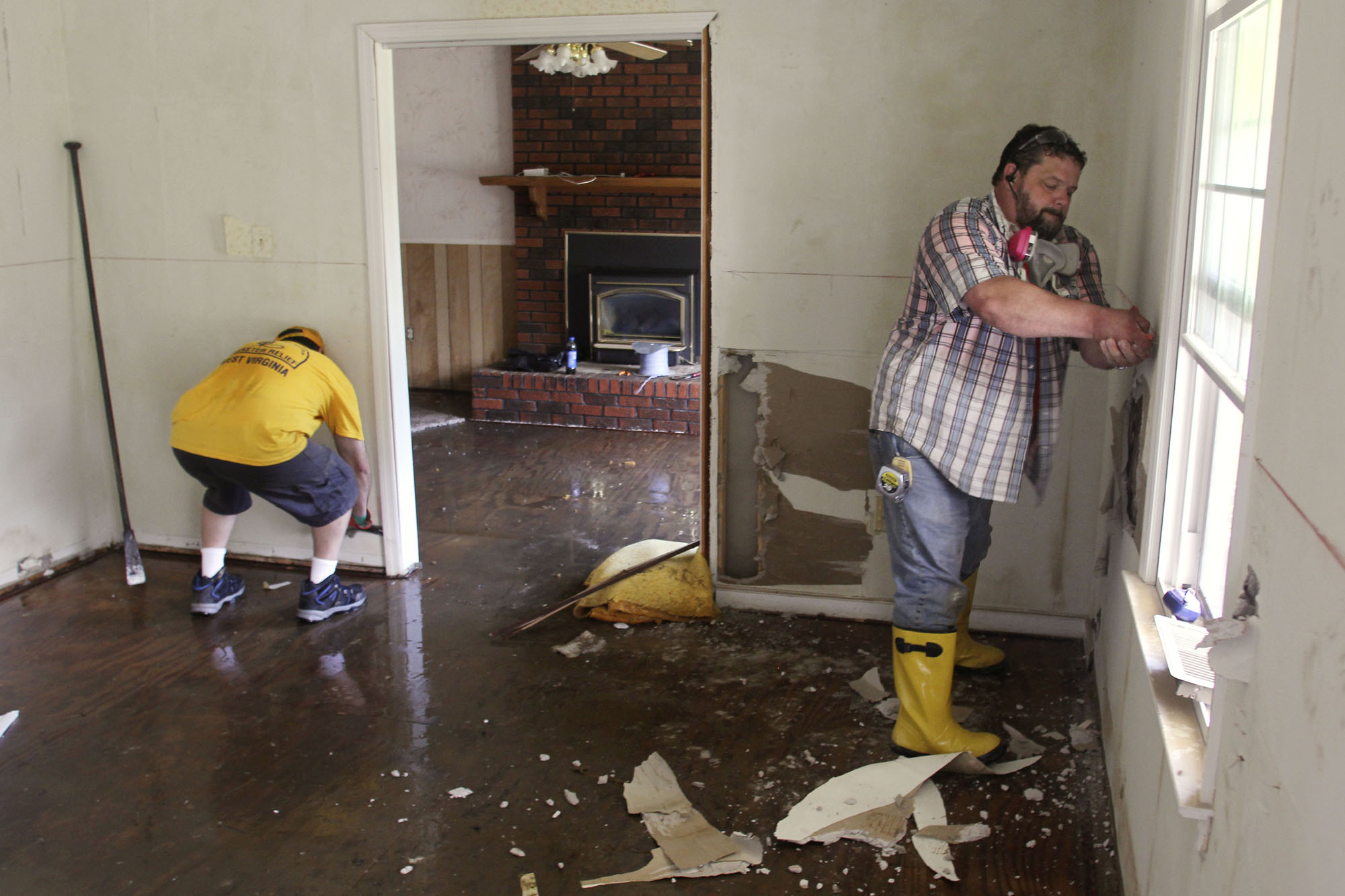
GREENBRIER COUNTY, W.Va. (BP) — Blue and “yellow” hard hats can be seen along eight West Virginia counties’ roads and streets — hats worn by Southern Baptist Disaster Relief volunteers. Engaged in recovery assessment, the SBDR response teams are making their way through communities that were under water just days ago, answering calls for help from numerous West Virginians left without power, vehicles and even homes.
 On June 23, torrential rains hit West Virginia, causing flooding that claimed at least 24 lives and more than 100 homes. More than 30,000 homes and businesses lost power.
On June 23, torrential rains hit West Virginia, causing flooding that claimed at least 24 lives and more than 100 homes. More than 30,000 homes and businesses lost power.
The Federal Emergency Management Agency (FEMA) described the flooding as a “historic” tragedy and applauded the continued efforts of relief response teams such as the American Red Cross and various SBDR units, as reported by the Associated Press.
West Virginia Gov. Earl Ray Tomblin tweeted his appreciation for state partners who provided critical resources to West Virginia as quickly as possible and announced that FEMA will expand federal funding to eight counties: Fayette, Clay, Roane, Summers, Monroe, Greenbrier, Kanawha and Nicholas.
Though the opportunity to receive federal funds can help rebuild the demolished communities, the clean-up and recovery process has already begun, with funding a priority for SBDR volunteers as they serve survivors.
 “We’re going to need blue and yellow hats into the foreseeable future,” said Danny Rumple, West Virginia Baptist Convention disaster relief ministry director. “We had a bit of rain after the initial flooding, but the sun’s out now. We can send those hats — those trusty volunteers — to go out and do what they were trained to do, to assess people’s homes for damage from the flood.”
“We’re going to need blue and yellow hats into the foreseeable future,” said Danny Rumple, West Virginia Baptist Convention disaster relief ministry director. “We had a bit of rain after the initial flooding, but the sun’s out now. We can send those hats — those trusty volunteers — to go out and do what they were trained to do, to assess people’s homes for damage from the flood.”
Several SBDR units were mobilized immediately on June 25 after state and federal officials identified West Virginia’s disaster areas. Search and rescue teams were deployed as well, and continued their work June 30. As of June 29, SBDR response teams were ready to conduct recovery assessment of homes and businesses across the affected counties.
Bill Johnson, who is managing relief efforts in Greenbrier County on behalf of the North American Mission Board, reported that more than 40 work orders already were submitted for repairs.
Johnson estimates more than 100 work orders will be submitted by the end of week. His estimates are based on 400 residence work orders already sent to command centers currently manned by 75 SBDR volunteers from West Virginia, Kentucky, North Carolina, Ohio and the Southern Baptist Conservatives of Virginia.
 Johnson and Rumple both agreed that donations would help sustain the long-term clean-up and recovery process that looms ahead for West Virginia.
Johnson and Rumple both agreed that donations would help sustain the long-term clean-up and recovery process that looms ahead for West Virginia.
“We know where to get more assessors, those who are trained in disaster response, but food and funding will continue to be necessities as the teams go out,” said Johnson, who currently oversees the feeding of displaced West Virginians in Greenbrier County.
“The area of greatest need for residents in Greenbrier County is feeding,” Johnson said. The SBDR teams supply two meals a day to each person who comes for help. “They have nowhere else to go.”
SBDR teams will continue to provide feeding, recovery, medical and mud-out units in the affected West Virginia counties for at least three to four weeks, Johnson said.
“People are still texting and calling me, asking for help,” Rumple said. “They’re distraught but are determined to rebuild their communities. They’re coming together, reaching out for help, and it’s an incredible effort to witness.
“West Virginians are always very grateful when we respond to them, and they often want to work alongside us. A lot can be done when folks dig in and work hard. A lot more can be done with the right resources and funding to do so,” Rumple said.
The North American Mission Board coordinates and manages Southern Baptist responses to major disasters through partnerships with 42 state Baptist conventions, most of which have their own state disaster relief ministries. Southern Baptists have 65,000 trained volunteers — including chaplains — and 1,550 mobile units for feeding, chainsaw, mud-out, command, communication, child care, shower, laundry, water purification, repair/rebuild and power generation.
To learn more about to help, contact the Baptist convention in your state or go to www.donations.namb.net/dr-donations. For phone donations, call 1-866-407-NAMB (6262) or mail checks to NAMB, P.O. Box 116543, Atlanta, GA 30368-6543. Designate checks for “Disaster Relief.”
Church leaders can explore how Send Relief comes alongside churches and state conventions to aid in times of disaster and meet other needs for relief across North America at www.namb.net/sendrelief.















